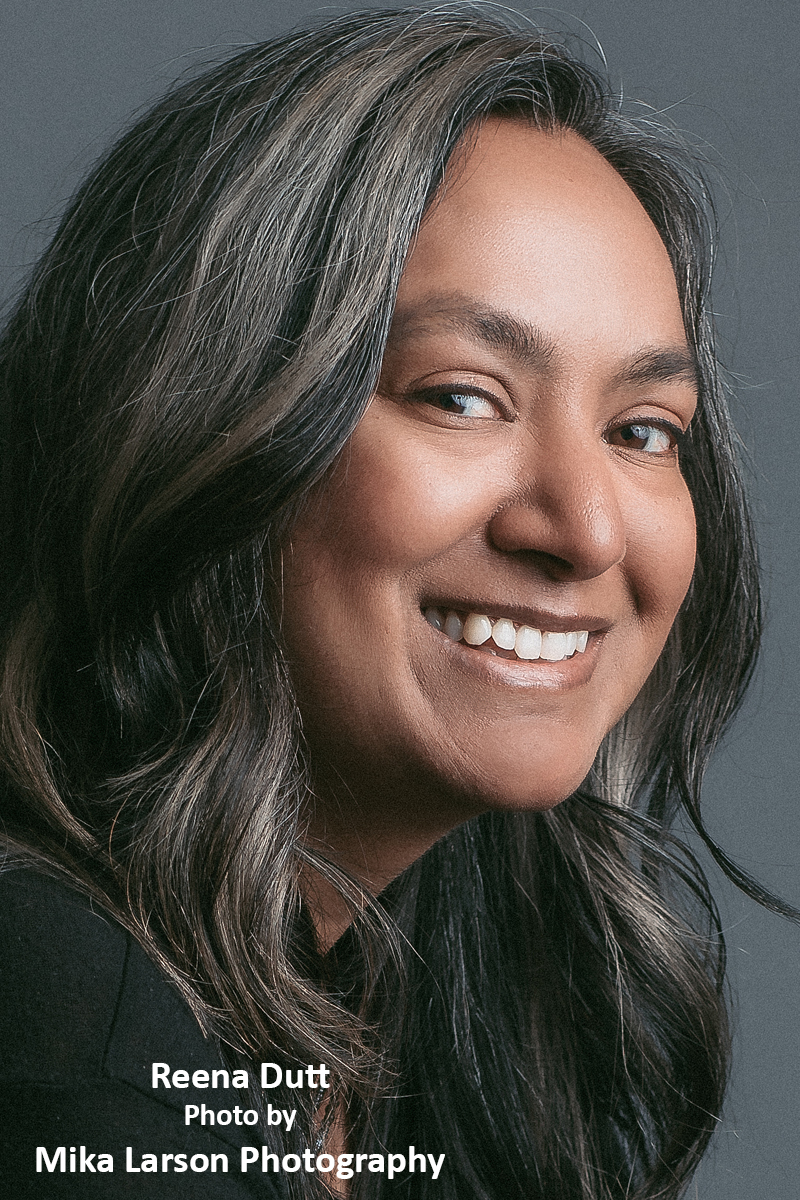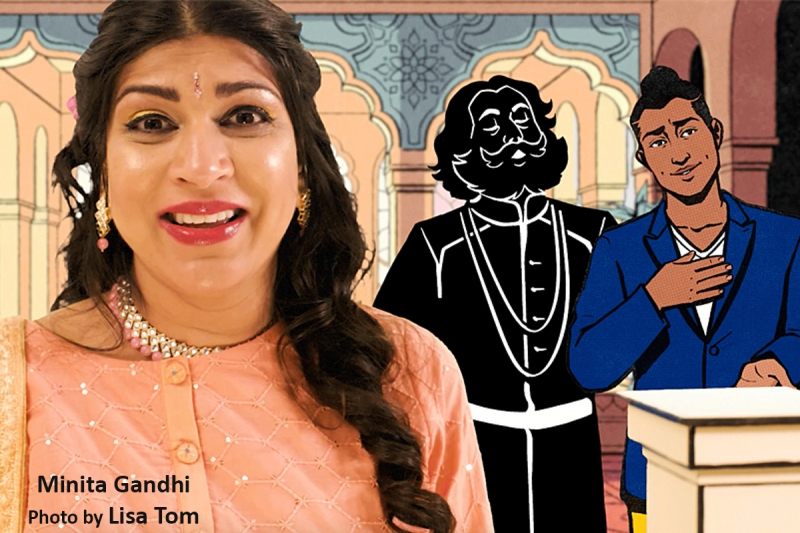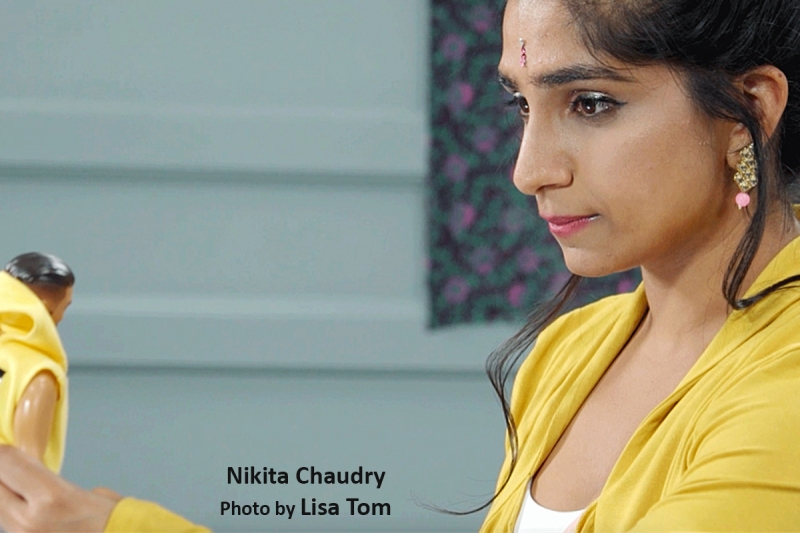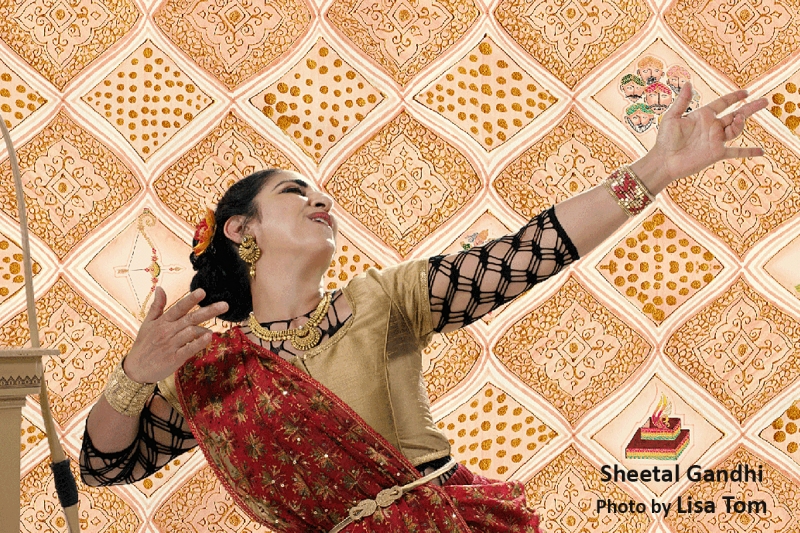Interview: Director Reena Dutt's Keeping Real Busy with THE SITAYANA & Many Other Projects
East West Players, in partnership w/San Francisco’s EnActe Arts & New York City’s Hypokrit Productions, presents the virtual world premiere of THE SITAYANA

East West Players, in partnership with San Francisco's EnActe Arts and New York City's Hypokrit Productions, presents the virtual world premiere of Lavina Jadhwani's THE SITAYANA (OR HOW TO MAKE AN EXIT) beginning September 25, 2021. Lavina's updated, upending take on the Hindu epic The Ramayana recounts the story through Sita's eyes, rather than Ram's eyes as in the original. Audiences attending the livestreams will be given a choice to one of the three unique incarnations of Sita.
Had the chance to pose a few questions to THE SITAYANA's director
Reena Dutt on her history with THE SITAYANA and what she's been doing the last pandemic months to keep creatively sane.
Thank you for taking the time for this interview, Reena!
What cosmic forces first brought you together with Lavina Jadhwani?
It was a strange whirl of circumstances which brought me around to Lavina. In August 2020, mid-quarantine, I decided to relocate to the Portland area since our industry was shut down in Los Angeles. I reached Portland and by chance noticed an organization called Advanced Gender and Equity in the Arts and they had a mentorship for which the application deadline had passed by one day. I went ahead and applied, since the form still worked to apply! Serendipitously I was matched with Lavina, and l realized just how much of a force of nature she is - as an artist, as an advocate and as a human. She was a wealth of information and support, and really allowed me to restructure how I was looking at this career path as a director. The timing couldn't have been better for her opportunity to be produced by East West Players - it literally rode the end of my mentorship, so we transitioned from mentor-mentee to collaborators.
Have you worked with any of THE SITAYANA's cast or creatives before?
Excitedly, no! That was one of the scariest things about the projects, as well as one of the most joyful. I had never met any of the designers on this piece, and I had only met the actors in passing - Nikita being a brand-new face to me. When working with folx you already know, there's a shorthand that happens in the process, and it's a process of reinventing the collaborative wheel when working with new folx, but the latter experience is a great way to add names to that roster of go-to designers and performers for the future.
What would your three-line pitch for THE SITAYANA be?
I cannot say it better than the East West Players' team: "Part epic tale, part coming of age story, THE SITAYANA is the ultimate breakup play." The one thing I might add is that a piece of theatre is not meant for every single audience. Never was. With this triple-adaptation, however, we hope the core of Sita's journey, adventures, conflicts, and life-questions find a place in your heart through at least one of these renditions.
Tell us the pre-production and production processes of this virtual premiere.
THE SITAYANA was always meant to be a virtual production, so approaching this text with a non-traditional marriage of film and theatre felt imperative to me. I knew our audiences were already inundated with Zoom readings and recorded content, so I wanted to make this somehow ... different. A friend had said to me that digital work allows us to explore in ways that are unaffordable for a live production, and I took that to heart, which is how three unique versions of this piece were formed. With luck, there will be something for everyone.
With that, I knew the rehearsal and pre-production process would be a challenging one. With severely truncated rehearsal times for each actor, a design team working on over-drive for all three shows and no tech or blocking time in the space for actors or the filming crew beforehand due to COVID precautions, I realized during the process, that my actors and filming crew would need to be incredibly malleable.
 The challenge was accepted by this hard-working team and they were ready to catch those curve balls. Through Zoom rehearsals we were able to work the text as much as possible and create loose blocking for the pieces. Unlike a film shoot where we would have weeks of planning for each location, this also needed to be simplified since we had less than seven hours to film 31 pages of script for each version (Indie films shoot an average of 6-8 pages per day for comparison). Knowing our limitations, we carved the simplest way to push through the piece without losing the creative elements that would make this digital, full-production unique.
The challenge was accepted by this hard-working team and they were ready to catch those curve balls. Through Zoom rehearsals we were able to work the text as much as possible and create loose blocking for the pieces. Unlike a film shoot where we would have weeks of planning for each location, this also needed to be simplified since we had less than seven hours to film 31 pages of script for each version (Indie films shoot an average of 6-8 pages per day for comparison). Knowing our limitations, we carved the simplest way to push through the piece without losing the creative elements that would make this digital, full-production unique.
Postproduction played a large part of the project, as you'll see through unique sound design, illustration and mehndi integrations that lend to the work. Postproduction workflow was very much in alignment with how film operates, so we wrapped up the project without too many surprises. I think I've watched each version at least 15 times for the process of notes, collaboration, and development as we found hurdles to cross and troubleshoot along the way, well after our actors' and physical creative work was complete.
I am incredibly grateful for the team that joined us on this - it could have never happened without them. The process also reminded me of why I love both mediums. The skills are so unique, even within the same departments. It gave me a sweet reminder that the opportunity to integrate my two loves - theatre and film - was a gift of experiencing the discovery of how those fabrics can be interwoven because of the pandemic.
You directed the west coast premiere of ANTIGONE, PRESENTED BY THE GIRLS OF ST. CATHERINE'S on the Sacred Fools stage March 2020. ANTIGONE closed before Los Angeles Times publicly announced ANTIGONE as a LA Times Critic's Pic. When did you find out about this critical honor? Were your emotions like a roller coaster?
Being an early-career director, I welcomed the news with disbelief when I was notified of this honor. It was already a gift to be given a mainstage production at Sacred Fools, a company that has been supportive of my work for the past few years. Little did I know, our thought-provoking show would be shut down a few days after we heard the news. I think the emotional roller coaster is real.
Being early-career, it's acknowledgement such as Critic's Pic that can [with luck] put a director on the map - reviews are a vehicle that let you know all the work your team put into actualizing the play, was not a tree falling in the forest.
The reality is, this is/was a global pandemic.
With that, I think the real honor is seeing how my cast (many for whom this was their first play in Los Angeles, or upon graduation) came together after the closure. One of our actors, Robert Paterno, organized a group check-in where our main cast, understudies and design team had an open door to a group Zoom so we could check in with each other. It's culture shock to come to a city to pursue this dream in the arts and have everything you've worked on for the past couple months come to an abrupt end, particularly if you don't have a pre-existing support system nearby. To this day, the real honor is seeing how those folx I had the opportunity to spend a month with in rehearsal, have what I hope will be life-long friendships that came out of the show because of all the unique circumstances.
What have you been doing the past pandemic months to keep creatively sane?
This past year has been a gift of time. I took the opportunity of the industry shutdown to relocate to the Pacific Northwest for the past year. I did not realize how reinvigorating it would be. Some sort of creative block lifted, and I almost immediately became involved as a mentee with AGE in the Arts and met Lavina. I was grateful to learn about her journey being based in Chicago, and about how the climate shifts regionally.
Then an old friend and colleague, Dámaso Rodríguez, advised me on the theatre scene in Portland where I was introduced to their development program that stemmed from the COVID closure at Artists Repertory Theatre -- Mercury Company. I applied and one of my projects was accepted, so I dove into writing POINTED PORTLAND a current day, virtual, semi-interactive murder mystery exploring death using the backdrop of the Chinese burial block in Lone Fir Cemetery.
 The largest change was diving into the audiobook world as a director and narrator. I have been directing books for Penguin Random House, and it has been a pure joy. I am reading literature about Indian and American history and activist titles that I never explored before, Young Adult novels where race and culture are used so beautifully woven into subtext that it becomes a universal story instead of defining identity, and it's all truly mind-blowing. When I was a kid, I didn't have access to this kind of material, so it's exciting to see what is being put out there and supported by publishers these days. All this to say Penguin Random House and their team truly lead by example - kindness, intelligence and an interest in authentic representation.
The largest change was diving into the audiobook world as a director and narrator. I have been directing books for Penguin Random House, and it has been a pure joy. I am reading literature about Indian and American history and activist titles that I never explored before, Young Adult novels where race and culture are used so beautifully woven into subtext that it becomes a universal story instead of defining identity, and it's all truly mind-blowing. When I was a kid, I didn't have access to this kind of material, so it's exciting to see what is being put out there and supported by publishers these days. All this to say Penguin Random House and their team truly lead by example - kindness, intelligence and an interest in authentic representation.
After the Asian hate crime in Atlanta, I was inspired by a friend's story as a Korean adoptee, and we produced a short film that I wrote and directed called Found. When restrictions loosened up, we filmed at the beautiful vintage theatre, The Columbia, in Longview, Washington. This was probably the most inspiring part of the past year - writing and creating this film with a team that was so passionate about being on a set, and a community that threw love and support at our team. It would not have been possible to do this film without a community like Longview's that supports the arts so very strongly. Its population may be less than 40K, but their love for art is mighty.
Last but not least - I grew a garden. There is something calming and revelatory of planting a seed that grows and flourishes with earth, water, and sun as its support system. I suppose that is what centered me the most (in life, and creatively) - the idea that basic elements are all we really need in order to flourish.
You've directed in cities all over the U.S. - New York City, Los Angeles, Portland. Do you direct any differently to gear towards the city or audiences you're directing in? Subtle cultural distinctions?
I have found that my directing style doesn't change based on location, but I have learned that the way I process the community I am working with needs to remain open. This is where I love tablework. When you have the opportunity to sit with your team with a script and have relevant conversations about the text but also stay open to where the conversation goes, you can learn a lot about where the community dynamic lives on a variety of issues. Like any process, it's part of gaging the room and adjusting how I approach the work based on the team's needs. You never know what a community or cast/crew's triggers are until you allow for the space to be filled with discussion. In terms of directing for the audience, I hope that I am hired because of my directing aesthetic and generally the Artistic Director's notes reflect their audience's needs (they know their patrons the best), so I wait for that to happen before changing the vision I walk in with.
What was your initial reaction to being named a 2021-2022 Drama League New York Directing Fellow?
I am still questioning whether this dream is real or if the Drama League team made a huge mistake (!!!)
When you took on the position of assistant director on The Fountain Theatre and East West Players' co-production of HANNAH AND THE DREAD GAZEBO, did you think you would be a part of the Ovation Awards downfall?
When I took on the position of Assistant Director on HANNAH all I was thinking about was the opportunity to assist Jennifer Chang, one of the most remarkable directors I have met. Not only did the rehearsal process teach me a lot about the way she works as a director, but also as a human - she consistently supported the actors in taking up space, being the lead of their own stories, owning their presence. She is truly one of the most inspiring directors of my generation. I think all our spines grew a few inches in that rehearsal room.
 So, when the error came up with Ovations, it was heartbreaking. Not just for the Asian community but for all the folx whose names or photos were misrepresented. The error was not just about race or negligence, but also about the fact that these institutions not only have very little support, but due to the lack of the support, the capacity to understand the minutiae, the impact of these 'small' mistakes, is exponential.
So, when the error came up with Ovations, it was heartbreaking. Not just for the Asian community but for all the folx whose names or photos were misrepresented. The error was not just about race or negligence, but also about the fact that these institutions not only have very little support, but due to the lack of the support, the capacity to understand the minutiae, the impact of these 'small' mistakes, is exponential.
I long for a world where the majority of our arts institutions have enough manpower and support to make space to see, and value, their cultural impact on our communities. If they had the bandwidth to understand the greater impact, perhaps they wouldn't throw in the towel, and instead use this experience (which I am fully aware was strongly guided by the political timing) and create a new entity that perhaps brings in leadership who are interested in guiding us to a more inclusive, equitable and sustainable industry in Los Angeles.
Who were your creative idols growing up?
I was a figure skater as a child and my idols were folx like Kristi Yamaguchi, Surya Bonaly, and Debi Thomas. They were the closest artists I could find that I felt I related to. As I got older, I started acting, and my drama teacher Mel Olson was my guiding light. He allowed me to explore the arts and encompass characters that I could learn from (these were roles I learned later in my life that I would NEVER audition for as a professional actor). David Goyette (now at Truman State University) was also a part of that journey, as a coach for our Speech and Debate team. I remember working on an interpretative (poetry) event, using a piece by Anne Sexton, and it was the first time I felt I could empathize with someone who I'd never come across in my lifetime. These moments changed my path in life, and why I value theatre and film so very much. I look back and thank the universe I had the opportunity to work with folx like them.
Did you have to experience any systemic racism in your adolescence?
In my youth in Mesa, Arizona (and Charlotte, North Carolina), I was very lucky. We were always surrounded by kind neighbors, teachers and friends. My parents somehow attracted open-hearted people into their lives. Perhaps it helped that we were a middle-class family, in a middle-class neighborhood, surrounded by the Mormon, Catholic and Jewish communities. Our school was very mixed in terms of race, and naturally, many of us (diverse folx and eccentrics) gravitated to the arts building, so we had each other. It wasn't until I started pursuing a professional acting career that I felt racism and the lack of understanding that folx have toward diverse communities and the variety of their life journeys. As a director, I am realizing firsthand, that if a casting director or producer has not been exposed to us, they'll never understand that we can share similar stories, even if the color of our skin, or ethnic background, is not written into the script. It's a process.
What was your parents' response to you wanting to pursue a career in the theatre?
My mother comes from an artistic family, so for her, it made sense. My father's family are all academics and educators, so it was a tough sell. Let's just say when I started this career, he would call my pursuit "International Communications" to his peers. Before he passed in 2015, he told me, "You are so close. Just keep working hard and you will get there," so I think his support became unquestionable.
At what event in your life did your parents begin to support your career goals wholehearted?
Support of career goals is complicated. I am not a parent, but I can understand the need to know your child is safe, stable, and has security. At the end of the day, the only support that can be expected is your own. Even if both your parents are your biggest fan (both of mine are/were) parental support is often something we long for, but can never expect. Once we get over that hurdle, we can focus on what inspires us to do this crazy career in the arts.
What is in the near future for Reena Dutt?
The near future entails a temporary relocation to New York to connect with my Drama League cohort for the next six months. Through the fellowship, I'll be taking on an Associate/Assistant Directing gig at a bucket list theatre (TBA), and the program culminates with my own direction of a one-act play as part of Directorfest in January. My short film Found will start its festival tour while my other film, Scattered, finishes off post. All this to say, come Summer 2022 I'm directing my first musical in Washington, and am pleased to then return to Artists At Play in Los Angeles for the world premiere of THIS IS NOT A TRUE STORY (a stunning dark comedy written by the brilliant Preston Choi) toward the end of the year.
Thank you again, Reena! I look forward to viewing your SITAYANA.
For viewing tickets to see the virtual world premieres of THE SITAYANA September 25th through the 27th, with livestream shows running through October 17th, 2021; log onto www.eastwestplayers.org
Comments
Videos

